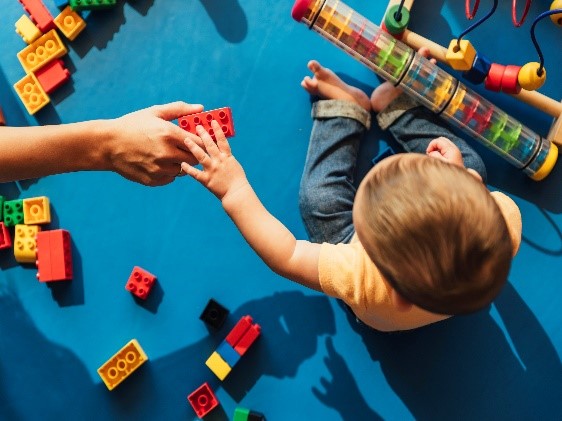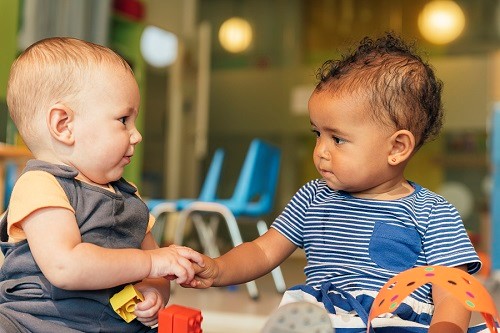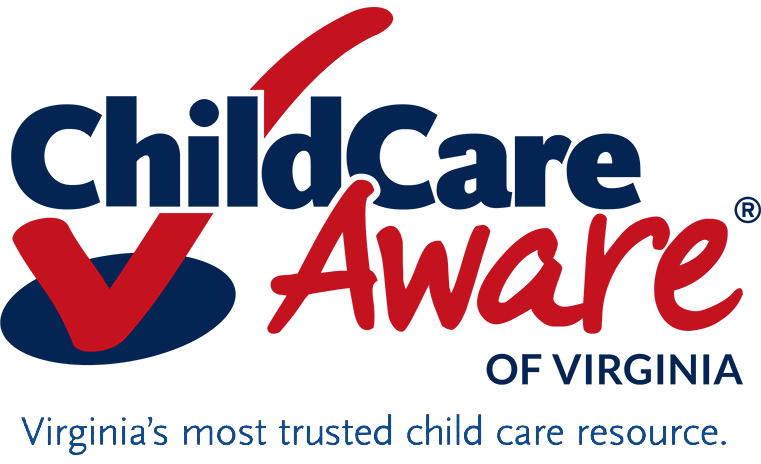
Fostering connections and strong relationships with your child are key to supporting their healthy social-emotional development. Let’s explore some relationship-building activities that you can add to your daily routine with your infants and toddlers.
Spend Time Together
This seems like a no-brainer. You might be thinking, “Well of course I have to spend time with my child to have a relationship with them.” While this may be obvious, take a moment to think about the last time you had the opportunity to have unstructured, uninterrupted time with your child? It can be difficult to carve out time from busy schedules and planned activities. Life gets busy, so you may not remember. Try to make it a priority to spend this time together every day. Play a game and let your toddler take the lead or have them help you make dinner. It’s important to be completely focused during this time- don’t try to multitask. Your full attention will make your child feel loved and special, not to mention all of the memories you’ll make. Have fun learning who your child is- their strengths, interests, personality, and challenges.
 Show Interest in Your Child’s Hobbies
Show Interest in Your Child’s Hobbies
Expressing interest in your child and their activities will help them feel supported and encouraged. You can show your sincere interest by making comments and talking about whatever it is that they are doing. If they are building with blocks, describe the structure they have built. Ask open-ended questions about it and have them explain to you: “Wow I see you’ve built a bridge, what the bridge is used for?” It may seem silly, but let yourself into their world and participate. It may mean getting down on your hands and knees and building your own block structure.
Let Your Child Express Their Feelings… and AcknowledgeThose Feelings
A large part of a positive, healthy relationship is feeling comfortable enough to express emotions freely and the ability to recognize the feelings of others. This skill begins to develop at a young age and is crucial to healthy adult relationships. Teach your child how to express emotions such as anger,
sadness or happiness in a healthy way. You can do this by labelingand modeling. Put a name to your own feelings by saying “I am upset that you didn’t listen when I told you it was time to go” or “I am happy that you helped me set the dinner table.” Whether the emotion is positive or negative, your child needs to be able to recognize and express it comfortably with you in order to establish a healthy relationship.
You can also model how to manage and cope with emotions. Let them know positive ways to release anger, such as running in the yard or drawing an angry picture. If they are feeling excited, throw a
happy dance party and share the excitement! Emotions are hard, soshow them you are there every step of the way.
Encourage Your Child to Make Friends
Give your child the chance to develop relationships with other children. This means scheduling play dates and structured time with peers. Peer to peer relationships teach children how to take turns and  share, problem-solving skills, and how to be a good friend. Children need to practice these important social skills- and not just with you!
share, problem-solving skills, and how to be a good friend. Children need to practice these important social skills- and not just with you!
You’ll probably want to be present during playdates to help your child learn and develop these skills. That way, when sticky situations come up, you’ll be there to help your child think through them and respond appropriately. It won’t always be the way you had hoped, but that’s why we practice! Eventually, you’ll be able to step away and watch your child navigate social situations with ease.
Additional Resources:
- Learn how you can support your child’s relationship-building skills with this short video
- 9 ways to teach children about feelings

